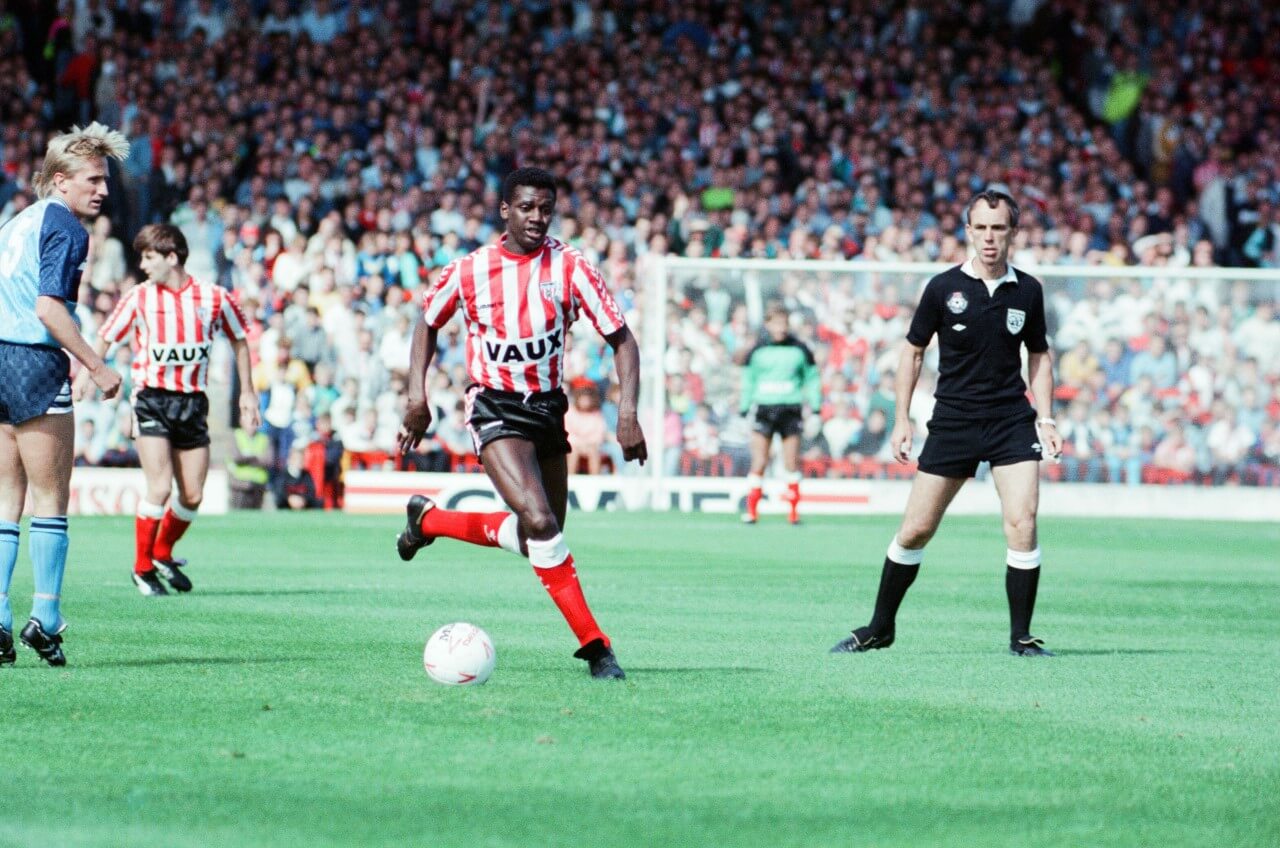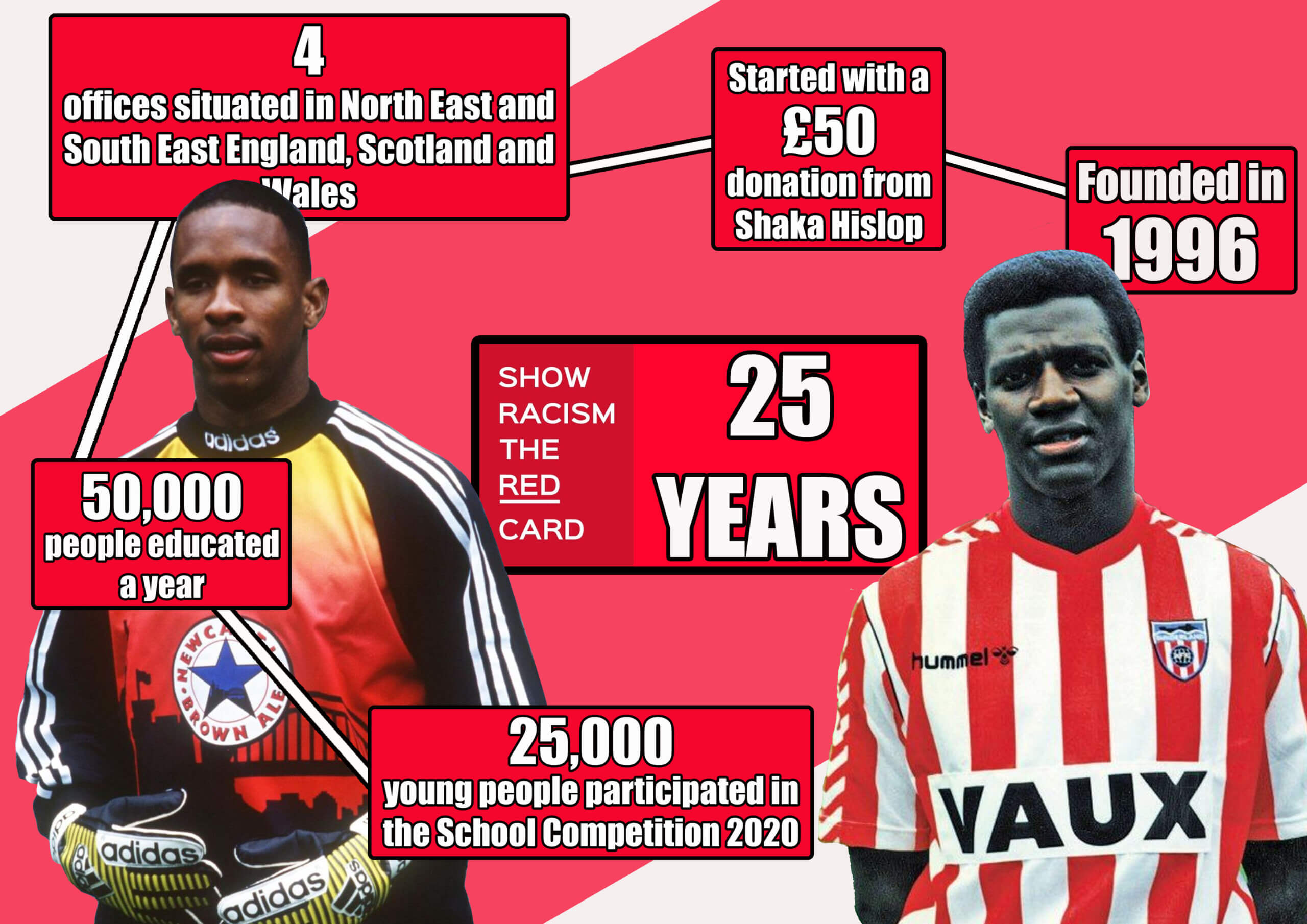How £50 educated 50,000 people: The growth of Show Racism the Red Card
Gary Bennett draws on his experiences of racism and the importance of anti-racism charities as Show Racism the Red Card celebrates its 25th anniversary
After the death of George Floyd and the Black Lives Matter movement in 2020, the importance of anti-racism charities to help tackle racism is higher now than ever before. Show Racism the Red Card celebrates its 25th anniversary this year after being found back in 1996 by Ged Grebby.
Gary Bennett, who is an ambassador for Show Racism the Red Card, recalls the situation regarding racism during his time at Sunderland and how there was little support available.
Bennett said: “I think it was very prevalent when I started playing. Obviously when I was involved in football, there weren’t as many black players or even foreign players playing when I first started out.”
“Yeah, it was challenging. It was something new as well to football. Not just to football clubs but to supporters as well.”
“There were no ways put in where you can tackle racism. What do you do? Who do you report to? It was a case of just get on with it or deal with it yourself.”
Ged Grebby, who founded the charity, revealed the one bit of luck which created the charity.
Grebby said: “I was working with Youth Against Racism in Europe. In the summer of 1994, we produced an education magazine around the issues of racism in the North East.”
“We sent it out to people and the bit of luck was that we sent it to Shaka Hislop. He returned a letter to us and £50 saying he wanted to be more involved.”
“Literally, that one piece of luck led to the formation of Show Racism the Red Card.”
Since its formation, Show Racism the Red Card has educated more than 50,000 people per year on the effect’s racism has in society.

Bennett believes the importance of educating people is paramount to helping tackle racism and getting the message out there as people are now “more understanding about racism”.
“The more people you can educate then the more they can get that message out. I think it’s very important that, you look at now, we’re more aware. I think we’re more understanding about racism. What it’s all about. I think we have to continue doing that.”
Since the Covid-19 pandemic meant that fans were not allowed to attend football league matches across England, the majority of racial abuse has come in the form of social media.
Bennett has called on social media companies to do more to combat racism and hold people accountable for their actions.
“For me, I think these major things on social media, they should be accountable.”
“You look at the punishment. If somebody if found guilty of putting any racist comments on social media, then what happens is that they might be banned for a week or two weeks. But they are allowed to come back on.”
It’s not just social media companies which has Bennett concerned, as he expressed his worry over the punishment handed out by the footballing governing bodies.
“I think we’ve been having this conversation or debate for many, many years about what can they do. People talk about fines. Do fines do anything to football clubs or players?”
“If you’re fining a club £10,000, does that have an effect on them? I don’t think so. If you’re fining a player, £5,000 even, is that going to have an effect? I don’t think it is.”
“I’ve had this conversation before in regards to UEFA, and you look at the people at the top who are making these decisions. You’re asking what experience have they had in regards of suffering from racism, and I imagine the majority of them would say none. They do not know what it’s like. You’ve got to have that experience.”
Grebby says that the current social climate and the Black Lives Matter movement has helped identify the importance of anti-racism educational charities.
“I think for anti-racism, this is a massive, massive movement and Show Racism the Red Card have never had as much public support as we have now.”
Bennett thinks that the impact professional footballers have on helping raising awareness for the charity has a massive in part in how it has got to where it is today.
“I think it’s huge. We talk about football, shall we say, is a very, very powerful tool. You’ve got some very, very powerful players who have a huge, huge say in society.”
“We’ve seen for instance, use Marcus Rashford as an example, the power that Marcus Rashford’s got and the changes he’s made in regards of free meals. Because of the background, the message which he was trying to get out, and being a footballer, it was well, well highlighted.”

Talking about Wear Red Day Grebby said: “It’s massive and it’s about awareness raising, it’s about solidarity. We’ve got buildings throughout the North East turning red; Penshaw Monument, the iconic bridges across the Wear and the Tyne.”
“It’s not just a question of raising money, it’s a case of raising profile and raising the profile of the charity and what we do.”
Elina Kukk, who works with Show Racism the Red Card, says it is crucial people are educated about racism.
“Many people only have exposure to a homogenous culture in their community and without education won’t be able to understand the harm racism does.”

Grebby spoke of his delight at the work the charity has done over the past 25 years saying: “I’m very proud of the work we do still and the impact that we have and the work that we do, particularly amongst young people.”
Bennett expressed his happiness at being involved with the charity from the off, however hopes the charity continues to grow.
“I’m overwhelmed that I was involved from day one. Sometimes you look back now and you think wow.”
“I think it’s a campaign which, as I mentioned before, affects everybody but we’ve got to just continue with the message and hopefully one day it will continue to improve.”
You can donate to Show Racism the Red Card by clicking this link or you can donate to Black Lives Matter by clicking here.



